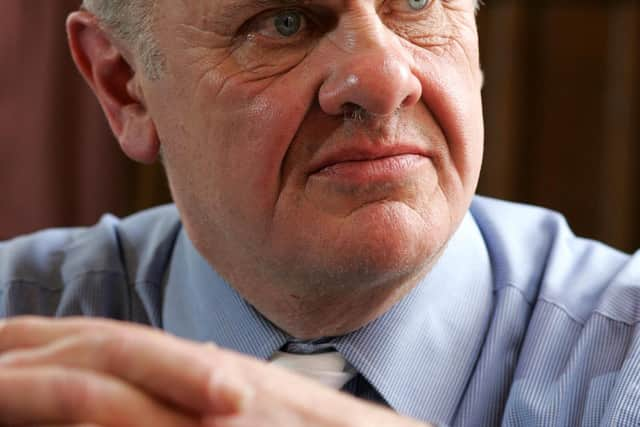Coronavirus: Clergy explain how they reconcile a loving God with almost 200,000 deaths in Covid-19 pandemic


Very few corners of the globe are so far untouched in some way, with some countries having faced devastating death rates. The unified nature of the fear and response internationally has made the world seem smaller than ever.
The individual tragedies of people and even children who have died alone in hospital, unable to see their loved ones as they slip away, are almost too painful to think about.
Advertisement
Hide AdAdvertisement
Hide AdAs of yesterday Covid-19 has been linked to the deaths of 194 human beings in Northern Ireland, each one having lived a unique life, leaving many sorrowing relatives behind.


A further 2,645 people in NI have tested positive for the virus, with over 600 requiring hospital treatment last week.
In the UK the deaths of more than 16,000 people have been linked to the virus while worldwide the total number of associated deaths is heading quickly towards 200,000. The last two figures are really too large to comprehend in terms of individual human tragedies. The long-term impact on mental health, the economic impact and even the deaths of people who would otherwise have availed of urgent hospital treatment cannot yet be guessed at.
And yet while shining examples of human sacrifice and courage have come to the fore – especially in the NHS – one question has also come increasingly into focus, however expressed: How do you reconcile the idea of a loving God with the current pandemic?
Advertisement
Hide AdAdvertisement
Hide AdBelow, we print responses from four of a number of clerics who were asked respond:


‘Our faith looks beyond the horrible realities of our pain and suffering’
Rev Norman Hamilton, former moderator of the Presbyterian Church in Ireland:
The coronavirus is a scourge of worldwide proportions and is bringing terrible pain to almost every country in the world.
Advertisement
Hide AdAdvertisement
Hide AdChristians, and many others, faced with the pain, are asking ‘Why, Lord? Why?’


That has been a constant call across the centuries and in every generation. It was asked in Auschwitz. It is asked every time genocide and famine strike, and when terrible things happen on our roads, to our children and in our families.
Suffering is part and parcel of human experience ever since we decided to rebel against God, and do things our own way. The whole of creation became, and remains disordered to this day.
And it is exceedingly difficult to offer a response that helps when the pain is present and intense. I have no easy answer – yet I still do believe in a loving God.
Advertisement
Hide AdAdvertisement
Hide AdCentral to that confidence are the events of Easter. God has not distanced himself from suffering and evil, for it was those very things that put his Son, Jesus Christ, on the cross that first Good Friday. The extent of his love for me was that he suffered for me.


Then the resurrection on that first Easter Sunday – the chains of evil and disorder broken. And that miraculous event opened up the wonderful prospect set out at the end of the Bible… ‘Look! God’s dwelling-place is now among the people, and he will dwell with them. They will be his people, and God himself will be with them and be their God. He will wipe every tear from their eyes. There will be no more death or mourning or crying or pain, for the old order of things has passed away.’
In a word, Christian faith looks beyond the horrible realities of our pain and suffering to that new reality.
‘Christ’s answer to suffering was a call to repentance’
Rev Dr David Clements is minister at Carrickfergus Methodist Church:
Advertisement
Hide AdAdvertisement
Hide AdThis is a version of the age-old question, why does God allow suffering? To discuss it in a philosophy class is one thing – to raise it at the bedside of a loved one, dying with a terrible disease is quite another.
Setting aside the origin of evil, in the past some have regarded natural disasters as judgment from God. Some voices say just that about Covid-19. It is possible that something like this might be a judgment, examples of which can be seen in the Old Testament. However, these always come with a word from God, and without that word we should reserve judgment.
In Luke 13 Jesus is asked about a moral atrocity carried out by Pilate. In answering he also includes the collapse of the tower of Siloam, which killed 18 people.
His inquisitors, believing as they did in God’s providential government, were inclined to think that these victims must have been guilty of some serious sins, which God was now punishing. But Christ said their interpretation was wrong.
Advertisement
Hide AdAdvertisement
Hide AdThe modern humanist, noticing that atrocities and disasters often happen to good people while wicked rogues escape, conclude that the unfairness of it all proves that there is no God. Their interpretation is wrong too.
There is coming a terrible day of judgment and we all do well to be ready for it. None of us are without sin of some kind – we do well to heed what Christ said in his conclusion on the matter: ‘repent lest we also perish’.
In the meantime, we would do well to reserve judgment on whether a particular disaster is a judgment from God. As C S Lewis put it: “God whispers to us in our pleasures, speaks in our conscience, but shouts in our pains: it is his megaphone to rouse a deaf world.”
‘God’s love is evident in our ICUs’
Fr Patrick McCafferty, parish priest of Corpus Christi, Ballymurphy, west Belfast:
Advertisement
Hide AdAdvertisement
Hide AdCreation is very beautiful but it is also broken and flawed. There exist, within nature, entities and realities that are deadly to human beings. The Covid-19 virus is one of them.
Our Christian faith is founded upon the Incarnation – the truth of God who comes, in the person of His Son, into the midst of suffering and what causes suffering.
Our faith and hope is in God made flesh, God who becomes vulnerable in Jesus Christ, God who is traumatised so as to reach down, into the deepest depths of our trauma and distress, so that through His wounds we are healed (Isaiah 53:5).
In the best of times and the worst of times, God is with His people. The Father, in infinite love and merciful compassion, sends to us His Beloved Son who is “Emmanuel, God-is-with-us” (Isaiah 7:14).
Advertisement
Hide AdAdvertisement
Hide AdHaving saved us by His death and resurrection, Jesus sends to us, from His Father and our Father, the Holy Spirit of them both. God the Holy Spirit keeps us within the embrace of the Most Holy Trinity. We are held fast by a Love stronger than death (Song of Songs 8:6), a Love without end (Psalm 136:1).
Where is God’s love in the pandemic? It is abundantly evident everywhere but especially in the hospitals and ICUs. Christ has entrusted to human beings His Father’s work which God’s Spirit animates and energises.
God is present in every place where there is loving care. The current crisis calls us to become more deeply converted, towards one another, as ministers of God’s tenderness to all His children. “Christ has no body now but yours” to continue the mission of love, said St Teresa of Avila.
‘God sent his son into our suffering’
Dr Paul Coulter, director of the Centre for Christianity in Society (www.christianityinsociety.org):
Advertisement
Hide AdAdvertisement
Hide AdThis is a time of anxiety for many. It’s not Covid-19 we fear – it’s just a microscopic strand of RNA in a fatty membrane.
We may well worry about the pandemic’s implications for employment, economy and education, but the deepest root of our fears is the deadly potential of this invisible virus, which exposes life’s fragility.
Above all else, we fear death. Fear of death may seem natural, but it’s a conundrum for those who think we’re just products of aeons of mindless evolution in a purposeless cosmos. If that’s true, our lives have no more meaning than the virus that threatens them.
Why, then, do we weep when loved ones die or shiver when we contemplate mortality? I believe these feelings aren’t illusions, but echoes of a half-forgotten truth, that we were created by a God who loves us but from whom we have been alienated. For Christians, this belief gives us immense value and our lives real purpose.
Advertisement
Hide AdAdvertisement
Hide AdWhere, then, is this loving God in this crisis? To answer, I must focus the vague idea of a ‘loving God’ on the God who is revealed supremely in Jesus Christ. Considering Jesus, entering our world of suffering with scandalous compassion, I can’t say God doesn’t care. Contemplating Him, dying shamefully on a cross for my sins, I can’t accuse God of not doing enough to help.
Reflecting on His resurrection and His promise of eternal life for those who trust in Him, I find hope that displaces the fear of death. Hearing His call to follow, I must admit my sin and commit with other Christians to express God’s love to others in words and embody it actions.
How do I reconcile the idea of a loving God with the current pandemic? I have a simple, one-word answer: ‘Jesus’.
A message from the Editor:
Thank you for reading this story on our website. While I have your attention, I also have an important request to make of you.
Advertisement
Hide AdAdvertisement
Hide AdWith the coronavirus lockdown having a major impact on many of our advertisers - and consequently the revenue we receive - we are more reliant than ever on you taking out a digital subscription.
Subscribe to newsletter.co.uk and enjoy unlimited access to the best Northern Ireland and UK news and information online and on our app. With a digital subscription, you can read more than five articles, see fewer ads, enjoy faster load times, and get access to exclusive newsletters and content. Visit https://www.newsletter.co.uk/subscriptions now to sign up.
Our journalism costs money and we rely on advertising, print and digital revenues to help to support them. By supporting us, we are able to support you in providing trusted, fact-checked content for this website.
Alistair Bushe
Editor